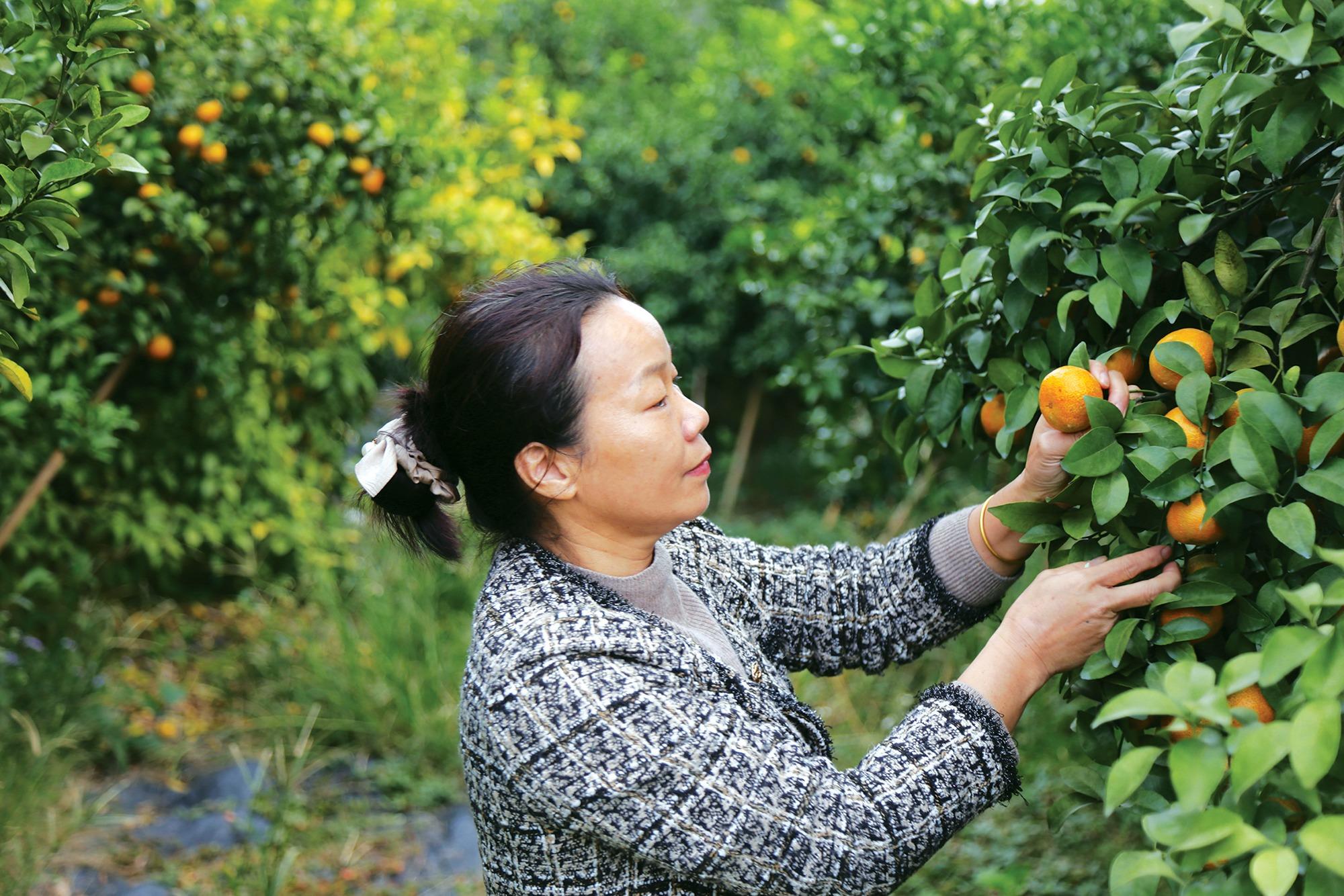 He Cuiyun, executive director of Sihui Cuitian Agricultural Technology Co, inspects shatangju — a type of tangerine known for its sweetness and a specialty of Zhaoqing’s Sihui county — at a plantation of the company in December 2023. (ZHANG TIANYUAN / CHINA DAILY)
He Cuiyun, executive director of Sihui Cuitian Agricultural Technology Co, inspects shatangju — a type of tangerine known for its sweetness and a specialty of Zhaoqing’s Sihui county — at a plantation of the company in December 2023. (ZHANG TIANYUAN / CHINA DAILY)
The city of Zhaoqing, located in west-central Guangdong province, relies heavily on primary industries such as agriculture, forestry, animal husbandry and fisheries — vital components of the local economy that contribute about 18 percent to the city’s GDP.
Sihui — an area in Zhaoqing — is renowned for its history of cultivating shatangju that dates back to the Ming Dynasty (1368-1644), when the small, very sweet variety of tangerine was offered as a tribute to the emperor. With an average annual temperature of 21 degrees C, the area’s warm climate is well-suited for growing the citrus fruit.
The shatangju plantation area in Sihui spanned more than 70 square kilometers in 2022, with production reaching 119,800 metric tons — up 50 percent over the previous year.
Roughly the size of a ping-pong ball, shatangju is well-known for the sweetness, which rivals that of granulated sugar. Peeling off the rind offers a sensory experience. Upon biting the fruit, its inherent sweet-and-sour nectar erupts and lingers between the teeth and over the lips. Savoring the pulp, one encounters a delightful paradox as if fine sugar granules are dissolving, while a hint of tartness permeates the tongue.
However, Sihui’s economic future is under threat amid a rapidly aging rural population and the shrinking number of young farmers, who see the low pay and sheer long hours of drudgery as not worth the sacrifice to make in the villages.
Zeng Furong, deputy director of Sihui’s rural revitalization administration, said there is a significant shortage of professionals in the agricultural and rural revitalization sectors, and those born in the 1980s and 1990s have shown little interest in agricultural jobs. Agricultural work is demanding, and people without such a background must learn various skills, such as farming and breeding.
To entice young people to take the plunge in agriculture, the local government’s focus is on improving infrastructure, leveraging industrial parks, and inducing bellwether enterprises to open up in Sihui.
Guangdong also launched a program in 2023 that aims to send 300,000 university graduates to the rural areas by 2025. The initiative includes offers of two-year civil service placements, volunteers or entrepreneurs to help grow business ideas.
“We usually recruit workers in their 50s and 60s with extensive experience in agricultural labor. Compensation is calculated daily and, based on capability, physically fit individuals able to earn up to 150 yuan ($21) per day,” said He Cuiyun, executive director of Sihui Cuitian Agricultural Technology Co. She took up her new role as a “new farmer” two years ago. “We encourage young people to join the workforce, particularly in sales, where their online skills are a big asset.”
“New farmers” — a term that refers to those who are equipped with modern agricultural production techniques — have a knack for branding agricultural products and e-commerce, and are adept at organizing villagers to work collectively and create businesses.
Sihui Cuitian offers employment opportunities to rural residents, and helps lift their income through market expansion and introducing new agricultural technologies to improve the quality of products. The company’s plantation area exceeds 50 square kilometers, including land from both the firm and its farmer partners.
He, 48, who has spent more than two decades cultivating shatangju, said she believes that what makes “new farmers” different from their predecessors is their encompassing knowledge of marketing, sales channels, technology, and fruit quality.
The company is marketing its products through social media shopping websites, such as lifestyle-sharing platform Xiaohongshu; Douyin, a short-video platform; and online stores in the WeChat instant-messaging app.
He began livestreaming businesses after attending a training session on livestreaming e-commerce sales organized by the local government two years ago as livestream shopping is popular among customers and available on most of the Chinese mainland’s social media platforms.
Although online sales are a crucial part of her strategy to raise the company’s revenue, the firm is also exploiting its cultural and tourism values, such as organizing on-site picking of shatangju — an activity that attracts families and employees of enterprises for weekend outings or informal business get-togethers.
Bulk purchasing by community groups is also on the rise, He said. To meet the demand, Sihui Cuitian’s farm supplies and distributes its products in bulk directly to residential neighborhoods in the urban areas.



